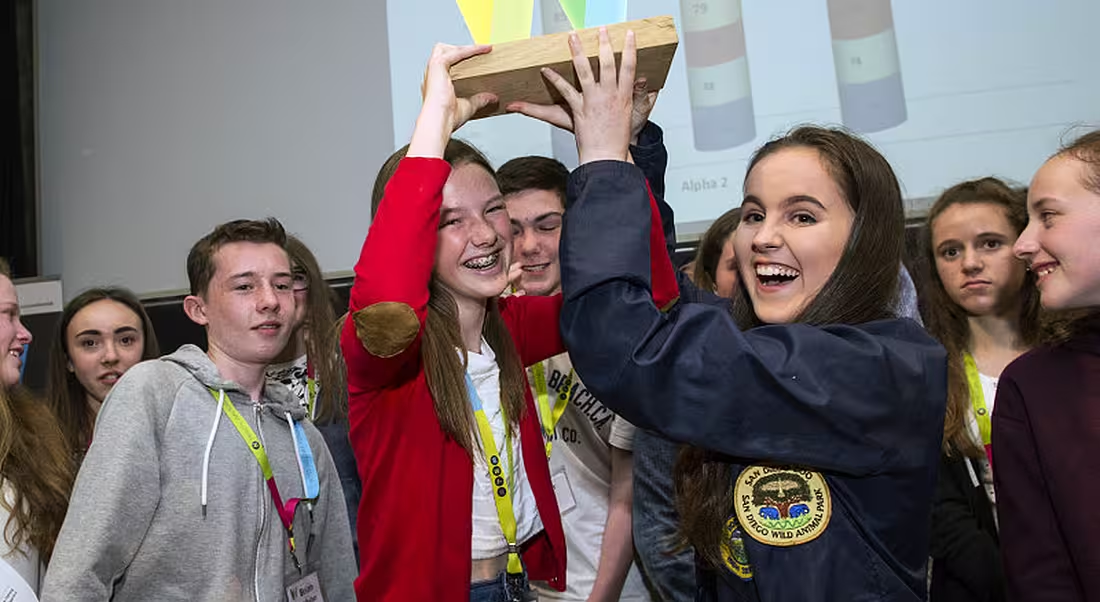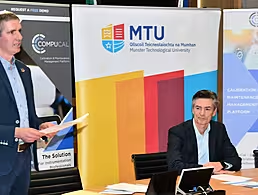An event to celebrate Ireland’s future scientists and their array of new ideas saw 71 secondary school students descend on Trinity College Dublin last weekend.
Attending the Trinity Walton Club, the students showcased prototypes and projects ranging from health wearables to a ‘room describer’ in a programme named in honour of Ernest Walton.
Walton won the Nobel Prize in Physics in 1951, which he shared with his colleague John Cockcroft, for their work in splitting the atom, and his daughter Marina Woods was on hand to congratulate the dozens of schoolkids in attendance on Saturday.
“The efficacy, the self-belief, these children showed was so impressive,” said Arlene O’Neill, director of the club and assistant professor in physics at Trinity College. “There was so much electricity in the air all day.”
The club brings dozens of students to Trinity every Saturday – primarily from Leinster, but with one even travelling from Clare. Promoting science, technology, engineering and maths, projects in labs help give children a firsthand look at the life of a researcher.
Committed to learning
“These young STEM pioneers committed their Saturday afternoons, over the past nine months, to broadening and deepening their STEM knowledge and skills,” said O’Neill.
“It has been a real privilege for the team of educators and I to support them on their journey, and we look forward to continuing to work with them over the coming years.”
The graduation ceremony was to celebrate the students’ first year in the club, with the group divided into three ‘Alpha’ groups to help enhance the tuition interactions.
Alpha ‘One’ were awarded the top prize for their work over the past 30 weeks, however, O’Neill was quick to point out how important the process is, not just awards.
“It’s all about enhancing their understanding of science, technology, engineering and maths,” she said. “They then showcase and portray that.”
Pictured at the event were Bank of Ireland’s Liam McLoughlin; director of the club Arlene O’Neill; Trinity provost Patrick Prendergast; ‘Alphas’ Danielle Power and Tess Loftus; Bank of Ireland’s David Tighe, Ernest Walton’s daughter Marian Woods, and Intel’s Philip Moynagh, via Paul Sharp
Among this year’s innovative projects were a health watch that uses voice recognition to help wearers track food intake, a room describer that allows blind people to gain information on the layout of a space by scanning a discreet tag, and a baby sock monitor that records temperature, pulse and movement, and then scans this info via Wi-Fi to parents’ phones.
The club will be part of the ‘Family Fringe’ element at this year’s Inspirefest, with Trinity Provost Dr Patrick Prendergast delighted with the programme, and its progress.
“We are educating the next generation of scientists and potential Nobel Prize winners. Building these students’ skills and deepening their knowledge in STEM amounts to a significant investment in science education.”
Another 300 students are starting this summer, so the future looks bright for science in Ireland.
Inspirefest is Silicon Republic’s international event connecting sci-tech professionals passionate about the future of STEM. Join us again from 30 June to 2 July 2016 for fresh perspectives on leadership, innovation and diversity. Book your tickets now.




